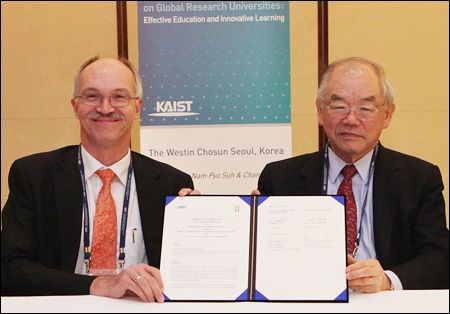KAIST agrees on dual degree program with Danish university

KAIST President Suh Nam-pyo, right, and Technical University of Denmark President Anders Overgaard Bjarklev pose for the camera after signing an agreement to boost academic exchanges at the Westin Chosun Hotel in central Seoul, Tuesday. / Courtesy of KAIST
The Korea Advanced Institute of Science and Technology (KAIST) signed four memorandums of understanding with the Technical University of Denmark Tuesday to boost bilateral academic exchanges in the fields of cyber education, biotechnology research and battery development.
KAIST President Suh Nam-pyo and Anders Overgaard Bjarklev, president of the top Danish research school, signed the agreements on the sidelines of an international forum on research universities held at the Westin Chosun Seoul.
Under the agreements, the two schools will launch a dual degree program utilizing interactive online and classroom teaching methods for full-time students. They will facilitate collaborative and interactive teaching and learning through group discussions via the Internet.
The universities also agreed to develop cyber education programs, e-learning modules and mathematics curricula for students.
They will also collaborate in the development of renewable biological resources, biorefining technologies as well as batteries for electric vehicles, according to KAIST.
Bjarklev was among some 80 presidents and vice presidents of 60 research universities from 27 nations that participated in the International Presidential Forum on Research Universities, hosted by KAIST.
Participants included Gene Block, chancellor of the University of California at Los Angeles and Bertil Andersson, president of Nanyang Technological University in Singapore.
Through discussion sessions, the participants shared the need to shift from traditional teacher-centered education to a student-centric learning environment, utilizing digital devices and information technology.
They adopted a joint statement, which called for expanding interactive learning between universities to help people anywhere in the world have opportunities to learn.
“Today’s students obtain knowledge and resources directly from the Internet and are more dexterous at using information technology,” the statement said. “To serve these 21st-century students, educators must develop an accessible and reliable medium of instruction that allows for independent learning.” <The Korea Times/Na Jeong-ju>

























































